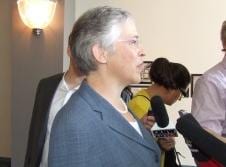A report calling for a halt to funding for “non-core services” by the Vancouver School Board could jeopardize the district’s progressive anti-homophobia work, critics say.
BC comptroller-general Cheryl Wenezenki-Yolland’s report, released by the education minister on June 4, recommends the reduction and eventual elimination of non-core services.
Education minister Margaret McDiarmid called for the report after the Vancouver School Board revealed it was having trouble cutting the $17 million required to balance its budget.
“Although these [non-core] services address community needs their delivery diverts funding away from the delivery of core educational services,” Wenezenki-Yolland writes in the report.
Vancouver school board chair Patti Bacchus says McDiarmid “didn’t have an answer” when she was asked to clarify what “non-core services” meant at a June 8 closed-door meeting the minister requested with the school board to discuss the report.
Later that day, Xtra was shuttled back and forth between the comptroller-general’s office and the education ministry for more than an hour in its attempts to find out if non-core services include anti-homophobia programming.
Finally, an education ministry spokesperson called to say the recommended funding halt to non-core services “should not” affect anti-homophobia education.
Vancouver school board trustee Jane Bouey isn’t convinced.
She says the report seems to call for a return to a time when school boards only spent money on the three Rs.
“We have a really different view about what’s core,” adds Bacchus. “We look at social and emotional well being as being a big indicator of success in school.
“Students need to feel safe, they need to feel supported, they need to feel they belong, and we know that in the areas of diversity, anti-racism, anti-homophobia, we’ve been leaders in this province,” Bacchus says.
“So, yeah, I’m very concerned about our anti-homophobia work,” she says.
Vancouver Elementary School Teachers’ Association vice-president Glen Hansman is also troubled by the non-core services references in the report.
“The special advisor seems to imply that the only things that a school district should be concerning itself with are the core services set out by the ministry,” he says.
“If a school district identifies a concern such as homophobia or transphobia in schools and, with the participation of the community moves forward to be proactive on those things, that is somehow seen as a bad thing.”
Bacchus notes the comptroller-general’s recommendation that the board change its “philosophy on consensus decision making” is a bone of contention for trustees. The report also chastises the board for an “unbalanced focus on advocacy versus financial stewardship.”
“[The trustees] feel that they’re doing an excellent job of governance, that the way they’re managing things is good. They’re seeming to me to be defending the status quo,” McDiarmid told reporters outside the meeting she left early.
“That would be something the comptroller-general definitely in her report has not recommended,” she says.
The comptroller-general has “made some serious recommendations about looking at how governance is done, at the balance between advocacy and stewardship, and I didn’t hear much interest in that [from trustees],” McDiarmid says.
In other words, the message is: don’t consult so much, make fast decisions, and focus on your finances, Bacchus contends.
“We see our stewardship role as much larger than that,” Bacchus says. “Our role is to be the public’s voice in the education system, and carry out the public’s wishes as their representative.”
The current school board trustees were elected by the citizens of Vancouver on a platform of advocacy for public education, Hansman points out.
“The fact that the special advisor would criticize the very thing that the public in Vancouver elected these trustees to do is really disrespectful to the people of Vancouver and very disrespectful to the trustees,” Hansman says.
Bacchus says the budget cuts people were initially rallying against in April – that prompted the comptroller-general’s report – are back on the table “in addition to some possible school closures.”
Already cut in half were the district’s anti-homophobia consultant’s hours – from four days a week to two.
McDiarmid offered no relief from the financial crunch.
Bacchus says a final budget vote is expected June 23.


 Why you can trust Xtra
Why you can trust Xtra


